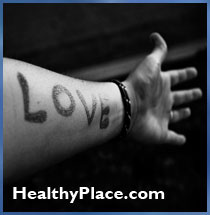Recovering From Self-Injury

![]()
Emily is our guest speaker. Is self-harm recovery REALLY a possibility or are self-injurers doomed to a life of misery and self-mutilation? Emily is an 8th-grade teacher who started self-injuring when she was 12. By the time she was a college senior, she was battling anorexia and severely injuring. The only thing that could help her was a treatment program. And it worked. Emily shares her story of pain and recovery from self-injury.
David Roberts is the HealthyPlace.com moderator.
The people in blue are audience members.
Self-Injury Conference Transcript
David: Good Evening. I'm David Roberts. I'm the moderator for tonight's conference. I want to welcome everyone to HealthyPlace.com. Our topic tonight is "Recovering From Self-Injury" and our guest is Emily J.
We've had several conferences where doctors come on and talk about recovery from self-injury. Then I get e-mails from HealthyPlace.com visitors saying that recovery is really impossible. It doesn't really happen.
Our guest, Emily, has recovered from Self-Injury. Emily started self-injuring when she was twelve. By the time she was a college senior, she was battling self-injury and anorexia. She says that while she was able to recover from anorexia, recovering from self-injury proved far more difficult.
Good evening Emily. Welcome to HealthyPlace.com. Thank you for being our guest tonight. So we can find out a little bit more about you, how did your self-injury behaviors begin?
Emily J: Good Evening. I really can't remember why I started, except that I was under a lot of stress at school.
David: And how did it progress?
Emily J: Well, my injuring was not severe until my senior year in college when my fiance broke up with me. I was in a lot of pain and I was looking for anything to lessen the pain.
David: When you use the word "severe", can you quantify that for me. How often were you self-injuring?
Emily J: It started out as very, very mild injury; for example, scratching my skin. Then it got to the point where I had to go to the emergency room almost every other day.
David: At the time, did you realize that something was wrong?
Emily J: I think I knew something was wrong when I was a very little girl.
David: What did you do to try and quit?
Emily J: I did not try to quit. It was my coping mechanism. I had endured sexual abuse as a small child and never learned healthy coping strategies. I didn't decide to get help, until my therapist threatened to quit seeing me.
David: Did you find that therapy helped?
Emily J: Somewhat. I think it prepared me for when I went to the S.A.F.E. Alternatives program (Self Abuse Finally Ends) in Chicago last year. It was only after attending and completing the program that I was able to quit.
David: You mentioned entering the self-injury treatment program, and I want to get to that in a few minutes. What about self-injuring made it so difficult to quit on your own?
Emily J: Like I said, it was my main coping mechanism. I wasn't able to handle my overwhelming feelings and emotions. I wasn't able to confront people or set personal boundaries. I became severely attached to authority figures, like my therapist. I liked self-injuring because it provided me with a sense of relief. Of course, that relief did not last very long at all and then I had large medical bills to deal with.
David: Here are a few audience questions, Emily:
lpickles4mee: How were you self-injuring?
Emily J: A boundary I would like to set is not to mention how I was injuring because it was graphic and I don't think that will serve any purpose for this chat on self-injury recovery. I will say that most people injure by cutting themselves.
Robin8: How did you get the courage to enter into recovery?
Emily J: My life was totally falling apart. I had lost so many relationships due to my self-injury behaviors and I almost lost my job over it. I knew I needed help because my life was one big mess. I hated myself and everything in my life and I knew the only way I could go, was up.
meagain: What was your family's reaction to your self-mutilation?
Emily J: I was terrified to get help, but now I'm so glad I did. My family didn't know quite how to react. My mother got mad at me and my dad was sympathetic but didn't understand. I couldn't talk to my sister about it. I think my sister basically thought I was crazy and my parents didn't know what to do or how to help me. As they learned more about self-injury, self-mutilation, I was very fortunate to have a very supportive family.
David: Did you just come out and tell them, or did they discover what was going on, on their own?
Emily J: I didn't tell them until after I graduated from college, and I only told them because I needed medical attention and I needed a ride. Before that, I tried to hide it.
Keatherwood: Did you find that you were treated badly at the hospitals when you had injured yourself?
Emily J: No, I was fortunate to have doctors that, at least, used numbing medication! Other self-injurers have not had such good experience with doctors. I'm ashamed of this, but most of the time I lied to the doctors so they wouldn't suspect that I was self-injuring. Of course, a couple of times it was obvious I was lying, but I was never questioned about it.
meagain: What would you say to someone who doesn't have any family for support? How would you convince them to get help?
Emily J: Well, people have to want recovery for themselves, not for their families, friends, etc. It's important to know that even without family help, and support, you are worth recovery. Sometimes friends can be your best support system.
David: Emily has been "fully recovered" for about a year. She entered into the S.A.F.E. Alternatives treatment program (Self-Abuse Finally Ends). Click the link to read the transcript from our conference with Dr. Wendy Lader, from the S.A.F.E. Alternatives program so you can find out more details about that.
Emily, can you tell us about your experience with the program. What it was like for you?
Emily J: The experience was absolutely wonderful. They helped me when years of therapy, hospitalization, and medications could not. They gave me the formula for a successful recovery, but I did the work. No one did it for me. The program was extremely intense: they taught me how to feel, how to challenge myself, set boundaries and they taught me that self-injury was just a symptom of a larger problem.
David: And that larger problem was?
Emily J: Many years of pain that I did not deal with. At S.A.F.E., I dealt with my childhood abuse, my negative self-image (non-existent) and years of letting people walk all over me.
David: How long were you in the self-injury recovery program?
Emily J: It is a thirty-day program, but I petitioned to stay an extra week, so I was there for a total of thirty-seven days.
David: Can you give us a brief summary of your typical day?
Emily J: There were at least five support groups a day. Each support group covered a variety of issues such as trauma group, art, and music therapy, role-playing, etc. There were a total of fifteen assignments that we had to complete. Each patient had their own psychologist, psychiatrist, social worker, a medical doctor, and a primary, who was a staff member who reviewed the writing assignments with us. When we weren't in group, we bonded with each other. We had our own "smoke room" therapy sessions.
David: Since entering the inpatient self-injury treatment program a year ago, Emily has not self-injured and says she's never been happier.
Emily, what was the toughest part about the recovery, stopping self-injuring?
Emily J: Learning to deal with my emotions instead of running and injuring. I had to feel the pain, anger, sadness, etc. that I had denied myself from feeling for so long. There were these things called impulse control logs - whenever I felt like injuring I had to fill out one. The logs didn't necessarily stop the urge but it helped me to identify my feelings so I could understand why I was feeling the way I was feeling.
David: We have a lot of audience questions, Emily. Let's get to them:
Montana: Could you please give us some examples of tools that can be used to keep from self-injury?
Emily J: Building a healthy support network of friends and family; finding a healthy hobby and pursuing that. When I got to S.A.F.E., they asked that I make a list of five alternatives to self-mutilation. Talking to peers, talking to staff, and listening to music were some of my alternatives.
To be honest, I still had urges for quite a while after coming home. I did not give into them because I didn't want to go back down that road. S.A.F.E. taught me to deal with my feelings and how to handle them. I still fill out a log every once in a while.
ZBATX: Can you talk a little about separating thoughts from feelings?
Emily J: I used to say things like I feel like crap. Well, crap isn't a feeling. Anger, sadness, joy, frustration, anxiety...those are all feelings. Saying you feel like dying or feel like injuring aren't feelings - those are thoughts.
heartshapedbox33: Did you ever feel like you were addicted to cutting?
Emily J: Oh yes, definitely. I knew self-injuring was ruining my life but I was powerless to stop it. Or I thought I was powerless.
rig: Can you give us a rough estimate of the cost of these self-injury recovery programs?
Emily J: Well, the program is very expensive and it's the only inpatient program in the country specifically for self-injury. Without insurance, I would say roughly $20,000 but my insurance and many others have paid for all of it. First, I went to my therapist, and one of the program directors called my insurance company and said they could either pay for this one-time program or continue to pay for every visit indefinitely. So they paid for it. I live outside of Illinois and they still paid. For those that simply cannot attend the program, I recommend the book "Bodily Harm" by Karen Conterio and Wendy Lader. They are the founders of S.A.F.E.
tootired: Do you think that the self-injury was ever for attention?
Emily J: No, because I usually hid it when I injured.
precious_poppy: The more I self-injure, the more I want to do it. What do you do then when you have no one to turn to?
Emily J: I think you have to be honest with yourself. Is injuring really working for you? Have you lost anyone or anything because of it? Do you want to spend the rest of your life mutilating yourself? I agree it's harder when you have no one to turn to, but that's why it's important to build a support system. Some examples would be attending a church with a large population of people your age, or something like that.
David: Here are a couple of audience comments regarding "paying for treatment":
Montana: From my experiences, the insurance would not pay the emergency room visits because it was obvious that it was involved with self-harm. I have to pay out of pocket.
rig: OH MY GOD! I can't even get anyone to insure me right now!!!!! If anyone knows of any insurance company that will insure posttraumatic stress disorder (PTSD), let me know!
Nanook34: What about aftercare?
Emily J: They have an aftercare group for people who live in the Chicago area, but I live nowhere close to Chicago so I had to build my own support here, after I got back.
David: Are you still in therapy?
Emily J: No. That was a big step for me, because I was very attached to my therapist in a very unhealthy way. She set boundaries with me but I was almost obsessed with her. Saying goodbye was so freeing. The S.A.F.E. Alternatives program recommends that you do continue therapy after the program, but I thought I was at a place where I did not need it, and I have not been in therapy for a year now.
David: Just to clarify, you went into the S.A.F.E. Alternatives program last summer and spent five weeks there as an inpatient, correct?
Emily J: Actually, I spent two weeks inpatient and the last three outpatient. S.A.F.E. owns some apartments right next to the hospital and we stayed there at night when we reached outpatient status.
David: Do you still have urges or feelings of wanting to self-injure?
Emily J: I have not had an urge in quite some time now, but when I first came home, I had them quite often. When I have an urge to self-injure, I fill out an impulse control log, so I can identify what I'm feeling and why I want to injure. After I fill out a log, the urge has usually diminished.
David: The SAFE program is in Chicago, right Emily?
Emily J: Berwyn, Illinois, a suburb of Chicago.
David: Can you describe the impulse control log for us. Can you give us an idea of what it contains?
Emily J: There are several boxes to fill out.
- time and location
- what I'm feeling
- what the situation is
- what would be the results if I did injure
- what would I be trying to communicate through my self-injury
- the action I took
- the outcome.
David: Here are some more questions, Emily:
twinkletoes: Have you found that other friends from the program you went with, are still injury-free as you are? Or have they relapsed?
Emily J: I met two people in the city I live in, that attended S.A.F.E. Of course, I have many friends nationwide that I still keep in touch with. Most are doing very well and are still injury-free.
jonzbonz: I was wondering how one goes about starting a program of recovery from self-injury without a therapist. I cannot afford one.
Emily J: Most communities have mental health resources where counseling is offered for free or at a reduced rate. Look in your yellow pages under mental health resources. Also, I mentioned the book "Bodily Harm." The book outlines everything the program does and it offers advice and help for people who cannot attend the program.
David: I'll add here, you might try your county mental health agency, a local university medical school psychiatric residency program, even the local women's shelter. You do not have to be battered to take advantage of their low-cost counseling services.
lisa fuller: Is there any medication that is helpful?
Emily J: I didn't find any that helped for my self-injury behaviors.
David: Why did it take an inpatient/ intensive outpatient program like S.A.F.E. to help you stop self-injuring? What did the program offer that your therapist couldn't or didn't?
Emily J: Mainly, time and an intensity that cannot be offered in a fifty-minute therapy session. Also, I was surrounded by a group of peers who were struggling with the same thing I was. Unlike most psychiatric hospitals who lump all psychiatric patients together, S.A.F.E. was just for self-injury.
meagain: I have found that many professionals don't really care--with that I get real belligerent. How, if at all, does this program deal with someone like this?
Emily J: I was probably the most belligerent I had ever been in my whole life! I was very scared, and masking it as anger, and taking it out on the staff. They are very used to this type of reaction.
twinkletoes: If you injured at S.A.F.E., did you automatically have to leave? Were there consequences?
Emily J: We had to sign a no-harm contract. If we broke it once, we were put on probation. If we injured after being put on probation, we would probably be asked to leave. I did break my contract but I learned a lot by being put on probation and answering the probation questions. I might add that I was absolutely terrified. How was I going to cope without my "best friend"? I learned how to cope and how to feel. Also, I had the mentality that I was too bad to be helped; that I was too severe and no one could help me. I held onto that belief even three weeks into the program. Well, a year later I'm injury-free and my life has never been better. I still have the normal stresses of everyday living, but as I've said, I know how to cope in a healthy manner now.
David: That's wonderful, Emily. Are you concerned about future relapse? Do you worry about that?
Emily J: NO! I have made it a personal goal of mine that I will NEVER self injure again. I've gained so much in this year, and I've worked too hard to throw it all away. That was a promise I made to myself, the minute I was on the plane back home.
David: Would you say that you are "in" recovery, meaning it's an ongoing process... or that you are "recovered", meaning you are completely healed?
Emily J: That is a hard question. Well, I would say I'm in recovery and I do believe it's an ongoing process because I always have to challenge myself to feel.
David: Here's an audience comment on another form of treatment:
crazygirl: I'm in DBT (dialectical behavior therapy) and I find that it is helping me a lot. It really changed my life and I would recommend it to those who have Borderline Personality Disorder.
Emily J: Ninty-nine percent of people I met, who also injure, have Borderline Personality Disorder. I do want to say that I don't believe S.A.F.E. is the only answer; but it was for me.
David: At the beginning of the conference, I mentioned that you also suffered from anorexia. Do you feel that the eating disorder and self-injury were linked in some way? (Read more on the types of eating disorders.)
Emily J: Yes, at S.A.F.E. I'd say 85% of the patients there have or have had an eating disorder. Mainly, all of us were diagnosed with Borderline Personality Disorder, an eating disorder, and self-injury.
David: Do you still struggle with the eating disorder?
Emily J: No. I was able to overcome that two years prior to going to S.A.F.E. Fortunately, I was able to overcome that but I had a harder time overcoming the self-injury.
David: I know it's getting late. Thank you Emily for coming tonight and sharing your experiences with us. Congratulations to you. I'm sure it wasn't easy, but I'm glad to hear that you are doing well. Also, thank you to everyone in the audience for coming tonight and participating. I hope you found it helpful.
Disclaimer: We are not recommending or endorsing any of the suggestions of our guest. In fact, we strongly encourage you to talk over any therapies, remedies or suggestions with your doctor BEFORE you implement them or make any changes in your treatment.
APA Reference
Tracy, N.
(2007, April 11). Recovering From Self-Injury, HealthyPlace. Retrieved
on 2025, July 2 from https://www.healthyplace.com/abuse/transcripts/recovering-from-self-injury


